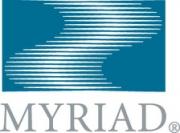Your family’s medical history is important. It helps to connect past, present and future generations with common traits and bonds. Your family history can also play an important role in your health.
Did you know having one or more family members with certain types of cancer means you may have an inherited risk for the same cancer?
Your family medical history is an important tool to help identify whether or not you have a higher than usual chance of being diagnosed with an illness in the future.
Cancer is a disease of abnormal gene function, which is caused by gene mutations. In some families, these gene mutations are passed from parent to child for many generations.
When someone has inherited an abnormal copy of a gene, at birth his or her cells already start out with one mutation in that respective gene. This genetic information is in every cell of the body making the cells more susceptible to additional mutations that occur over time. That’s why cancers caused by inherited syndromes tend to occur earlier in life than cancers of the same type that are not inherited.
In fact, certain inherited syndromes lead to nearly a 100 percent chance of getting some cancers.
Fortunately, knowing your family medical history allows you and your health care provider to take action and significantly reduce your risk. Myriad’s genetic tests can identify if you have the genetic variations that can cause certain inherited cancers.
Once a mutation has been found in a family member, close relatives (parents, siblings, aunts, uncles, etc) also have a 50 percent chance of having that mutation. DNA testing is a well-established testing process. Relatives either do or do not have the mutation that runs in the family.
To help assess whether or not you might be a candidate for genetic testing, take the Hereditary Cancer Quiz. The quick and easy quiz can arm you with information to discuss your cancer risk with a health care provider and ask for further evaluation if needed.
During the quiz, you will learn about red flags within your own history or your family history, and why a hereditary cancer consultation might be right for you.
Although most insurers typically cover hereditary cancer genetic testing, financial assistance programs may be available to help patients who cannot afford out-of-pocket costs.
You can find more information about hereditary cancer and the hereditary cancer testing process by visiting www.mysupport360.com .
Reviewed on December 6, 2012
by Maryann Gromisch, RN
Edited by Jody Smith
Article by Lynette Summerill


Add a CommentComments
There are no comments yet. Be the first one and get the conversation started!